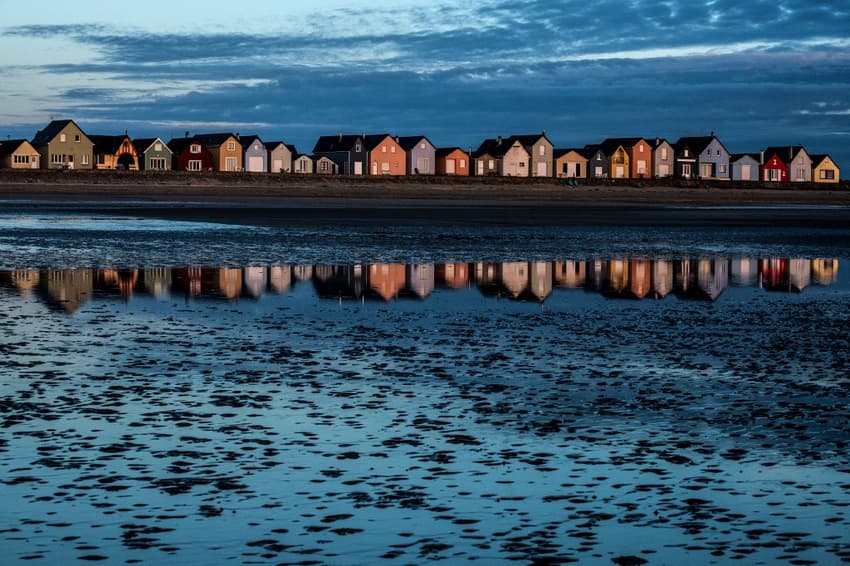Northern French communes ban swimming after beaches contaminated

Authorities in northern France have banned swimming at the beaches of Urville-Nacqueville, Ravenoville and Foucarville following a bacterial contamination.
Many will regret that the sea is no off-limits - particularly in the midst of one of the country's most severe heatwaves in history.
On Friday evening the Regional Health Authority of Normandy warned of a bacterial contamination of three beaches along the Channel - Urville-Nacqueville, Ravenoville and Foucarville. The communes of La Hague and Sainte-Mère-Eglise then moved to ban swimming.
En raison de contaminations bactériologiques importantes sur des échantillons d’eau de baignades (Sainte-Mère-Eglise et La Hague), la baignade est interdite sur les plages de Ravenoville – Les dunes et La Hague/Urville – Les quais à compter du 17 juinhttps://t.co/9GiGw43iB0 pic.twitter.com/gP07PrkIeY
— ARS Normandie (@ars_normandie) June 17, 2022
Local decrees mention high levels of E. coli as well as Enterococcus in the water.
Experts believe that the high prevalence of Enterococcus is likely due to sewage.
"In the case of the Channel beaches, the fact that there is Enterococcus is a sign that there is feacal contamination in the water," said infectious diseases expert Jean-Paul Stahl in a FranceInfo interview.
The ban on swimming at Urville-Nacqueville will go on until at least Tuesday June 21st and will only be lifted if tests show that the contamination has settled down.
The ban on swimming at the beaches of Ravenoville and Foucarville will last until June 30th.
Other contaminations
France has suffered other bacterial contaminations in recent days.
On Friday, residents of Châteauroux in the Indre département were warned to stop drinking tap water after high levels of E. coli were detected.
The exact source of the outbreak is unknown.
Among the many hypotheses put forward by scientists and local officials is that there has been some kind of sewage leak or that somehow bacteria from an abattoir entered the water supply - E. coli is often found in the intestines of cattle.
Children and infants are particularly vulnerable to the bacteria. Local officials have banned the bathing or showering of these groups until the water is deemed safe.
Comments
See Also
Many will regret that the sea is no off-limits - particularly in the midst of one of the country's most severe heatwaves in history.
On Friday evening the Regional Health Authority of Normandy warned of a bacterial contamination of three beaches along the Channel - Urville-Nacqueville, Ravenoville and Foucarville. The communes of La Hague and Sainte-Mère-Eglise then moved to ban swimming.
En raison de contaminations bactériologiques importantes sur des échantillons d’eau de baignades (Sainte-Mère-Eglise et La Hague), la baignade est interdite sur les plages de Ravenoville – Les dunes et La Hague/Urville – Les quais à compter du 17 juinhttps://t.co/9GiGw43iB0 pic.twitter.com/gP07PrkIeY
— ARS Normandie (@ars_normandie) June 17, 2022
Local decrees mention high levels of E. coli as well as Enterococcus in the water.
Experts believe that the high prevalence of Enterococcus is likely due to sewage.
"In the case of the Channel beaches, the fact that there is Enterococcus is a sign that there is feacal contamination in the water," said infectious diseases expert Jean-Paul Stahl in a FranceInfo interview.
The ban on swimming at Urville-Nacqueville will go on until at least Tuesday June 21st and will only be lifted if tests show that the contamination has settled down.
The ban on swimming at the beaches of Ravenoville and Foucarville will last until June 30th.
Other contaminations
France has suffered other bacterial contaminations in recent days.
On Friday, residents of Châteauroux in the Indre département were warned to stop drinking tap water after high levels of E. coli were detected.
The exact source of the outbreak is unknown.
Among the many hypotheses put forward by scientists and local officials is that there has been some kind of sewage leak or that somehow bacteria from an abattoir entered the water supply - E. coli is often found in the intestines of cattle.
Children and infants are particularly vulnerable to the bacteria. Local officials have banned the bathing or showering of these groups until the water is deemed safe.
Join the conversation in our comments section below. Share your own views and experience and if you have a question or suggestion for our journalists then email us at [email protected].
Please keep comments civil, constructive and on topic – and make sure to read our terms of use before getting involved.
Please log in here to leave a comment.